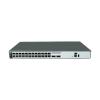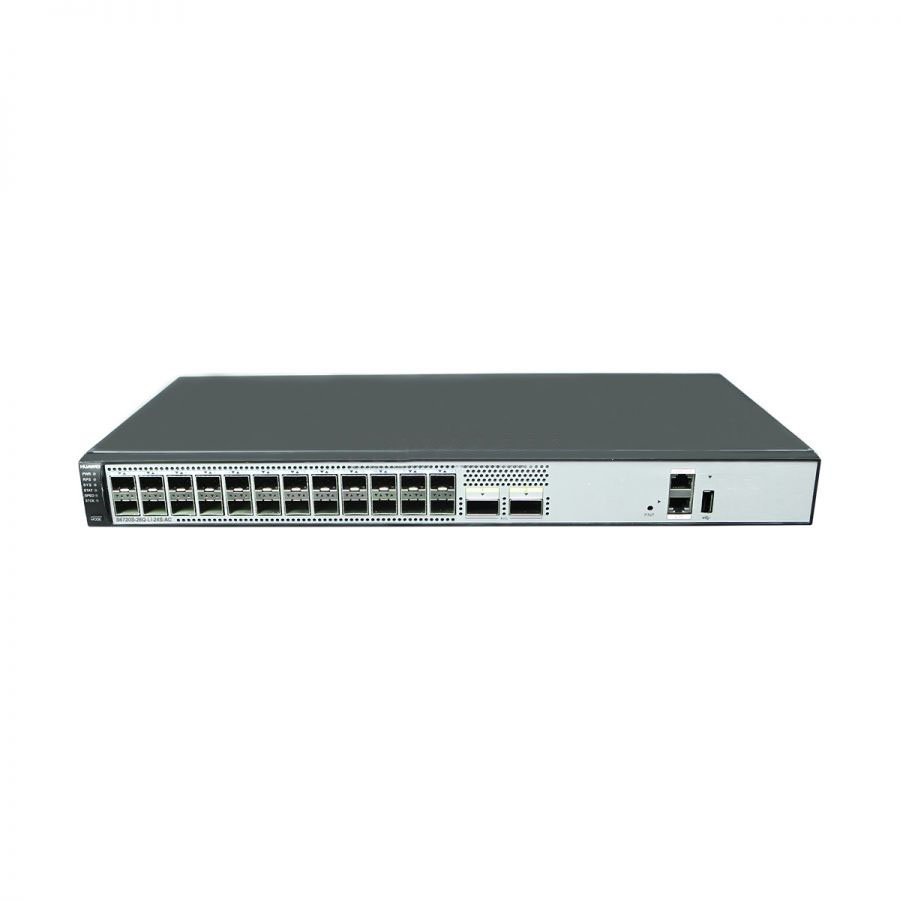-
$

Huawei S6720S-26Q-LI-24S-AC es un conmutador administrado equipado con 24 ranuras SFP + (10 Gb / s) y 2 ranuras QSFP + (40 Gb / s). La capacidad de conmutación del dispositivo es de 1,28 Tb / s y la velocidad de reenvío de paquetes es de 240 Mp / s. El conmutador está diseñado para su uso en redes de campus y centros de datos. Se distingue por un ancho de banda muy alto, también es ideal para otras aplicaciones donde hay una necesidad de conectar muchas redes más pequeñas.
El producto ofrecido admite routing IPv6 e IPv6, incluido routing estático, servidor DHCP / DHCPv6, RIPv1, RIPv2, RIPng, OSPF y OSPFv3. También admite routing de multidifusión, incl. PIM-DM, PIM-SM (también IPv6), IGMP, MSDP o RPF. Además, proporciona soporte completo para multicast Layer 2, VLAN (incluido QinQ) y un nivel adecuado de seguridad. Permite el apilamiento físico, el número máximo de dispositivos en una pila es 9 y el rendimiento es de 176 Gb / s. El conmutador puede actuar como un cliente SVF (Super Virtual Fabric): es una tecnología que permite la virtualización de la arquitectura de red de conmutadores de núcleo / agregación, conmutadores de acceso y puntos de acceso a un dispositivo.
Las caracteristicas principales:
- 24 ranuras SFP + (10 Gb / s);
- 2 ranuras QSFP + (40 Gb / s);
- capacidad de conmutación: 1,28 Tb / s;
- velocidad de envío de paquetes: 240 Mp / s;
- gestión de capa 3 (incluidos OSPF y RIP);
- la capacidad de trabajar como cliente SVF;
- fuente de alimentación AC y RPS.
Especificación:
| S6720-26Q-LI-24S-AC | |
| Puertos | |
|---|---|
| Puertos 10G | 24 ranuras SFP+ |
| Puertos 40G | 2 Ranuras QSFP+ |
| Puertos de gestión | |
| ETH | Sí |
| Consola (RJ45) | Sí |
| USB | Sí , USB 2.0 |
| Procesador | |
| Taktowanie | 1 GHz |
| Ilość rdzeni | 2 |
| Memoria | |
| Memoria RAM | 1 GB |
| Memoria flash | 512 MB, incluidos 240 MB disponibles para los usuarios |
| Alimentación | |
| Tipo de fuente de alimentación | Fuente de alimentación de AC incorporada |
| Redundancia | Fuente de alimentación incorporada y RPS en modo 6: 1 |
| RPS | Sí |
| Rango de voltaje recomendado |
100 - 40 V AC 50/60 Hz |
| Rango de voltaje máximo |
90 - 264 V AC 47 - 63 Hz |
| Corriente de entrada máxima | 3 A |
| Consumo máximo de energía | 100,2 W |
| Consumo de energía al 30% de carga | 67,1 W |
| Enfriamiento | |
| Método de enfriamiento | Activo |
| Numero de ventiladores | 3 |
| Flujo de aire | De izquierda a derecha |
| Liberación de calor | 342 BTU/h |
| Propiedades físicas | |
| Dimensiones | 420 x 220 x 43.6 mm |
| Altura | 1 U |
| Peso | 4,2 kg |
| Propiedades ambientales | |
|
(a largo plazo) |
0 - 1800 m: 0°C - 45°C
El rango de temperatura desciende 1 ° C por cada 220 m |
|
(término corto) |
0 - 1800 m: -5°C - 50°C
El rango de temperatura desciende 1 ° C por cada 220 m |
| Temperatura de almacenamiento permitida | -40°C - 70°C |
| Humedad del aire permitida | 5%-95% sin condensación |
| Sonoridad a temperatura normal | 46.5 dB(A) |
| Sonoridad a alta temperatura | 72.9 dB(A) |
| Presión sonora a temperatura normal | 34.6 dB(A) |
| MTBF | 39.2 lat |
| Software | |
| Ethernet | |
| Funciones básicas Ethernet |
Full-duplex, halfduplex, and auto-negotiation Rate autonegotiation on an interface Flow control on an interface Jumbo frames Link aggregation Load balancing among links of a trunk Transparent transmission of Layer 2 protocol packets Device Link Detection Protocol (DLDP) Link Layer Discovery Protocol (LLDP) Link Layer Discovery Protocol-Media Endpoint Discovery (LLDP-MED) Interface isolation Broadcast traffic suppression on an interface Multicast traffic suppression on an interface Unknown unicast traffic suppression on an interface VLAN broadcast traffic suppression VLAN multicast traffic suppression VLAN unknown unicast traffic suppression |
| VLAN |
VLAN specification: 4094 VLANIF interface specification: 1024 Access mode Trunk mode Hybrid mode QinQ mode Default VLAN VLAN assignment based on interfaces VLAN assignment based on protocols VLAN assignment based on IP subnets VLAN assignment based on MAC addresses VLAN assignment based on MAC address + IP address VLAN assignment based on MAC address + IP address + interface number Adding double VLAN tags to packets based on interfaces VLAN mapping Selective QinQ MUX VLAN Voice VLAN Guest VLAN |
| GVRP |
GARP GVRP |
| MAC |
MAC address: 32K Automatic learning of MAC addresses Automatic aging of MAC addresses Static, dynamic, and blackhole Sticky MAC MAC address flapping detection MAC address spoofing defense Port bridge |
| ARP |
Static ARP Dynamic ARP ARP entry: 8K ARP aging detection Intra-VLAN proxy ARP Routed proxy ARP |
| Ethernet loop protection | |
| MSTP |
STP RSTP MSTP VBST BPDU protection Root protection Loop protection Defense against TC BPDU attacks |
| Wykrywanie pętli zwrotnych | Loop detection on an interface |
| SEP | SEP |
| Smart Link |
Smart Link Smart Link multi-instance Monitor Link |
| RRPP |
RRPP Single RRPP ring Tangent RRPP ring Intersecting RRPP ring Hybrid networking of RRPP rings and other ring networks |
| ERPS |
G.8032 v1 G.8032 v2 ERPS semi-ring topology ERPS closed-ring topology |
| IPv4/IPv6 forwarding | |
| Routing IPv4 i unicast |
IPv4 static routing VRF DHCP client DHCP server DHCP relay DHCP policy check Routing policies IPv4 routes: 8K RIPv1 RIPv2 OSPF Policy-based routing (PBR) |
| Routing multicast |
IGMPv1/v2/v3 PIM-DM PIM-SM MSDP IPv4 multicast routes: 1,5K IPv6 multicast routes: 0,5K Multicast routing policies RPF |
| Funkcje IPv6 |
IPv6 protocol ND ND entry ND snooping DHCPv6 snooping RIPng DHCPv6 server |
| Layer 2 multicast | |
| - |
IGMPv1/v2/v3 snooping IGMP snooping proxy MLD snooping Multicast traffic suppression Inter-VLAN multicast replication |
| Fiabilidad | |
| Stackowanie |
Service Maximumnumber of stacked devices: 9 Stack bandwidth (Unidirectional): 176 Gb/s |
| VRRP | VRRP standard protocol |
| Ethernet OAM | |
| EFM (802.3ah) |
Automatic discovery of links Link fault detection Link troubleshooting Remote loopback |
| CFM (802.1ag) |
Software-level CCM 802.1ag MAC ping 802.1ag MAC trace |
| OAM association | Association between 802.1ag and 802.3ah |
| Y.1731 |
Unidirectional delay and jitter measurement Bidirectional delay and jitter measurement |
| Funciones QoS | |
| Traffic classification |
Traffic classification based on ACLs Configuring traffic classification priorities Matching the simple domains of packets |
| Traffic behavior |
Traffic filtering Traffic policing (CAR) Modifying the packet priorities Modifying the simple domains of packets Modifying the packet VLANs |
| Traffic shaping |
Traffic shaping on an egress interface Traffic shaping on queues on an interface |
| Congestion avoidance | Tail drop |
| Congestion management |
Priority Queuing (PQ) Weighted Deficit Round Robin (WDRR) PQ+WDRR Weighted Round Robin (WRR) PQ+WRR |
| ACL | |
| Filtrowanie pakietów Layer 2 - Layer 4 |
Number of rules per IPv4 ACL: 2K Number of rules per IPv6 ACL: 2K Basic IPv4 ACL Advanced IPv4 ACL Basic IPv6 ACL Advanced IPv6 ACL Layer 2 ACL User-defined ACL |
| Configuración y gestión | |
| Logowanie i konfiguracja |
Command line interface (CLI)- based configuration Console terminal service Telnet terminal service SSH v1.5 SSH v2.0 SNMP-based Web page-based configuration and management EasyDeploy (client) SVF OPS |
| Sistema de archivos |
Directory and file management File upload and download |
| Supervisión |
eMDI Hardware monitoring Log information output Alarm information output Debugging information output Port mirroring Flow mirroring Remote mirroring Energy saving |
| Actualizar |
Version upgrade Version rollback |
| Seguridad | |
| Seguridad ARP |
ARP packet rate limiting ARP anti-spoofing Association between ARP and STP Dynamic ARP Inspection (DAI) Static ARP Inspection (SAI) Egress ARP Inspection (EAI) |
| Seguridad IP |
ICMP attack defense IPSG for IPv4 IPSG user capacity: 1000 IPSG for IPv6 IPSGv6 user capacity: 512 |
| Protección local contra ataques | CPU attack defense |
| MFF | MFF |
| DHCP Snooping |
DHCP snooping Option 82 function Dynamic rate limiting for DHCP packets |
| Protección contra ataques |
Defense against malformed packet attacks Defense against UDP flood attacks Defense against TCP SYN flood attacks Defense against ICMP flood attacks Defense against packet fragment attacks Local URPF |
| Autenticación y autorización de usuarios | |
| AAA |
Local authentication Local authorization RADIUS authentication RADIUS authorization RADIUS accounting HWTACACS authentication HWTACACS authorization HWTACACS accounting |
| NAC |
802.1X authentication MAC address authentication Portal authentication Hybrid authentication |
| Policy association | Functioning as the access device |
| Administración de redes | |
| - |
Ping Tracert NQA NTP sFlow SNMP v1 SNMP v2c SNMP v3 HTTP HTTPS RMON NETCONF/YANG |
| Interoperabilidad | |
| - |
VLAN-based Spanning Tree (VBST) Link-type Negotiation Protocol (LNP) VLAN Central Management Protocol (VCMP) |






 Polski
Polski English
English Italiano
Italiano Español
Español Čeština
Čeština Српски
Српски Deutsch
Deutsch Ελληνικά
Ελληνικά Slovenský
Slovenský




